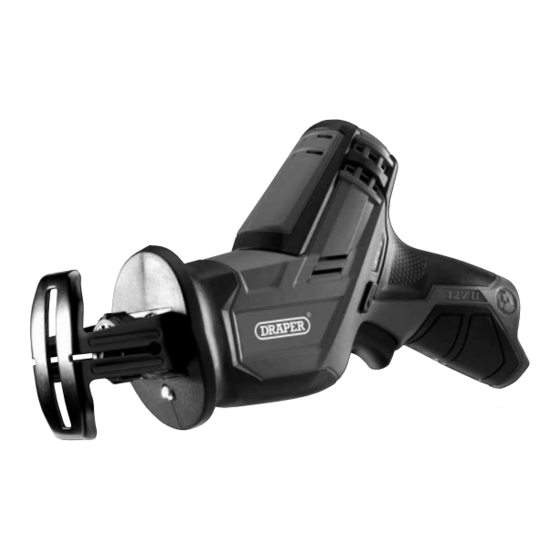Draper RS12VD Manuel de l'utilisateur - Page 9
Parcourez en ligne ou téléchargez le pdf Manuel de l'utilisateur pour {nom_de_la_catégorie} Draper RS12VD. Draper RS12VD 20 pages.

5.2 ADDITIONAL SAFETY INSTRUCTIONS FOR RECIPROCATING SAWS
–
Hold the power tool by insulated gripping surfaces, when performing an operation where the
cutting accessory may contact hidden wiring or its own cord. Cutting accessory contacting a
"live" wire may make exposed metal parts of the power tool "live" and could give the operator
an electric shock.
–
Use clamps or another practical way to secure and support the workpiece to a stable platform.
Holding the workpiece by hand or against your body leaves it unstable and may lead to loss
of control.
Changing blades
–
Ensure the saw is unplugged before changing blades, and take care to prevent entrapment of
the fingers between the blade and the shoe. Ensure the blade is secure before use.
–
Use the appropriate blade for the material being cut. Different blades are available from your
Draper stockist.
–
Only use blades in perfect working condition. Discard and replace any cracked or bent saw
blades.
When sawing
–
Use of the mains cable. Ensure the mains cable is kept well away from the saw blade and
ensure an adequate electrical supply is close at hand so that the operation is not restricted by
the length of the cable.
–
Allow sufficient clearance beneath the work to ensure the blade does not come into contact
with the floor, bench etc.
–
Switching off. Never place the saw on a table or bench if it has not completely stopped.
The saw blade will continue to operate for a short time after the trigger has been released to
stop the saw.
–
Cutting of pipes. Use caution when cutting hollow pipe and do not cut material where the
blade can enter the pipe when fully retracted, this can cause the blade to strike the inside of
the pipe causing the user to experience unexpected reaction forces.
–
Cutting into walls. Do not cut through walls or cavities without checking for hidden electrical
wires or water pipes etc.
–
Do not attempt to remove tool from work until the blade has completely stopped and allow
time for it to cool before touching the blade immediately after use.
–
Use clamps and vices to secure the workpiece where possible.
–
Cutting sheet materials. Do not cut material less than at least twice the pitch of the saw blade.
At least two teeth must be in contact with the work at all times.
–
Beware of foreign objects. When cutting pre-used wood, ensure all nails have been removed
beforehand. Nails will damage the wood saw blade.
–
Cooling agents. When cutting metals, always use a cooling agent i.e. cutting/soluble oil.
–
Do not attempt to saw small objects including those which cannot be properly secured.
Always hold the saw with both hands.
– 9 –
